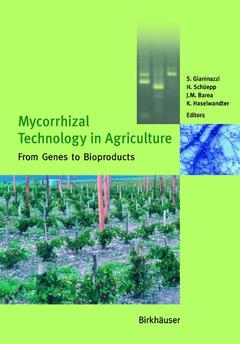Description
Mycorrhizal Technology in Agriculture, Softcover reprint of the original 1st ed. 2002
From Genes to Bioproducts
Coordinators: Gianinazzi S., Schüepp Hannes, Barea J.M., Haselwandter K.
Language: English
Keywords
Fungi; Lysin; Pathogen; agriculture; growth; microorganism; mycology; mycorrhiza; physiology; plant; plant growth; plants; quality; soil; transport
Publication date: 10-2012
296 p. · 16.5x23.5 cm · Paperback
Publication date: 08-2002
296 p. · 15.5x23.5 cm · Hardback
Description
/li>Contents
/li>Comment
/li>
THE VOLUME REPRESENTS AN INTEGRATE DEMONSTRATION THAT AM SYMBIOSIS IS A CRUCIAL COMPONENT TO ASSURE PLANT HEALTH AND PRODUCTIVITY AND SOIL QUALITY WIDELY DISCUSSES THE POSSIBILITIES OF TECHNOLOGY TRANSFER OF AM INTO COMMERCIAL PRACTICES PUTS SPECIAL EMPHASIS ON PROBLEMS LINKED TO QUALITY INOCULUM PRODUCTION AND USE PRESENTS SUCCESSFUL EXAMPLES OF THE INTRODUCTION OF AM FUNGI INTO PLANT PRODUCTION SYSTEMS
These books may interest you

Va Mycorrhiza 220.72 €



